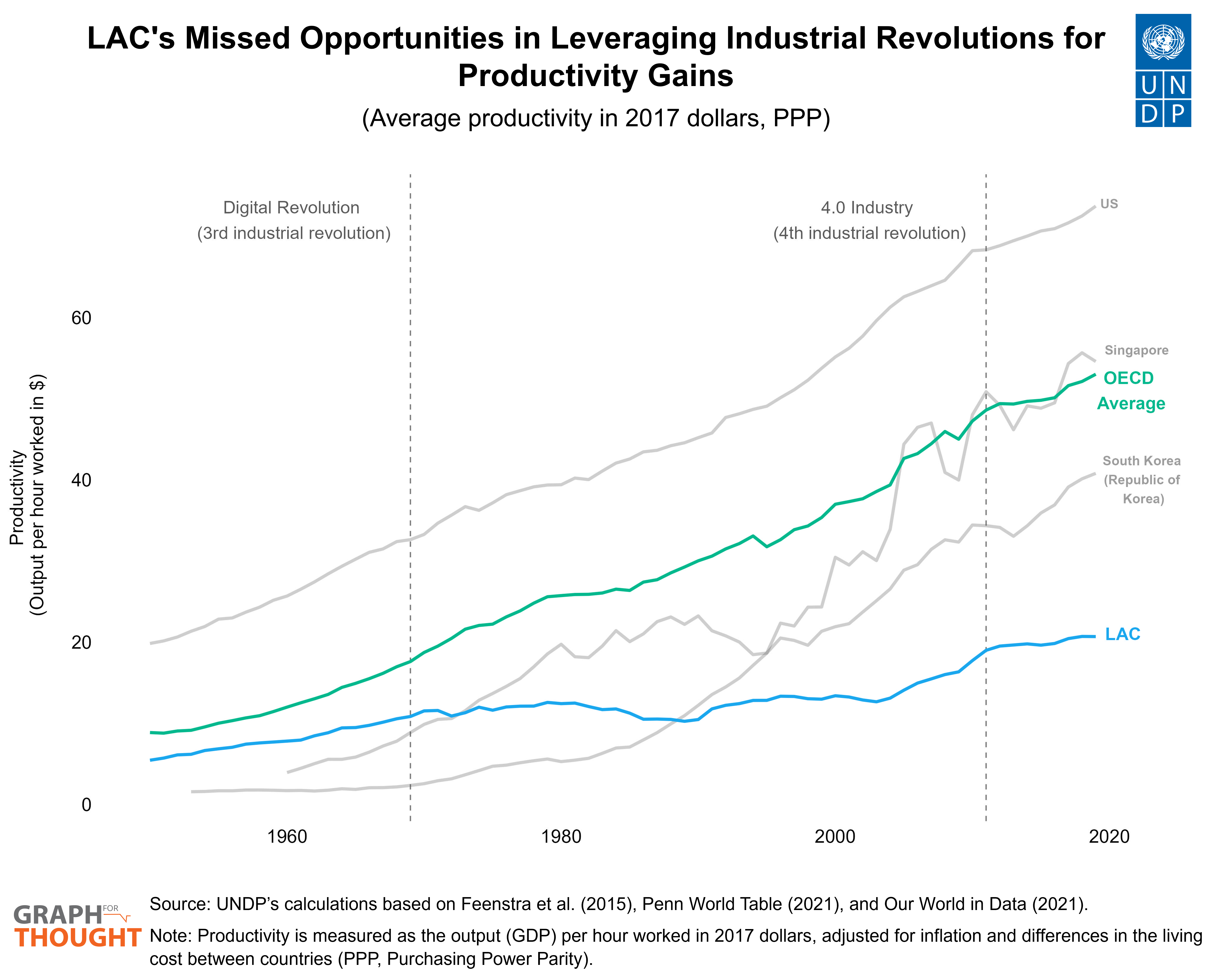Riding the Digital Wave: Will Latin America and the Caribbean take its shot at reshaping productivity?
April 11, 2024
Artificial intelligence (AI) - broadly defined as the ability of machines and systems to acquire and apply knowledge, and to carry out intelligent behaviour, seems to be everywhere these days: in political discourse, displayed in art museums, at the forefront of labor strikes, or, as one of the most increased search words on Google between 2022 and 2023.
A primary concern surrounding AI revolves around its potential to reshape the employment landscape with emerging tools and capabilities. This #GraphforThought examines the projected impact of AI on labor markets and productivity in Latin America and the Caribbean (LAC).
Using data from the IMF (2024), the following graph displays the exposition (AI's potential to replace or complement job tasks, possibly eliminating or altering them) and complementarity (AI's role as a supportive technology boosting job productivity) scores for LAC. 1
At first glance, the region seems to have low AI exposure, with six out of ten jobs seemingly "insulated" from disruptions. Among the remaining 40% of jobs, on average, only one out of ten (12.6%) exhibits high complementarity with AI, where AI could make workers more productive if they upskill. While this sounds promising, it hints at the region's lack of readiness to join and capitalize on the technological revolution: whereas in advanced economies, one in four jobs will be enhanced by AI, only one in eight jobs will be complemented by LAC. In other words, LAC is missing its chance to ride the AI wave.
Unfortunately, this would not be the first time that LAC missed an opportunity to benefit from a technological revolution. Looking at productivity trends over the past six decades, we see that prior to the onset of the third industrial revolution, which heralded the era of digitalization, automation, and the internet, LAC's productivity surpassed that of countries such as Singapore and South Korea. However, while these countries seized the opportunities presented by digitalization to strengthen their economies, regional productivity levels remained stagnant, increasing only marginally from 25% to 27.8% over the last 50 years (1970 to 2017).2

Countries that successfully embraced the third industrial revolution, such as South Korea and Singapore, did so partly through substantial educational investment, policies promoting export-led growth, and a stable macroeconomic environment. In LAC, on the other hand, a myriad of overlapping factors, including a highly volatile economic context, a productive fabric characterized by high levels of informality and a predominance of small, low-productivity firms, weak economic diversification, as well as some protectionist tendencies, prevented the region from benefitting from technological advances. Unfortunately, many of these characteristics remain today, including a highly informal labour market (as shown in Chapter 5 of UNDP's Regional Human Development Report 2021), hindering LAC´s prospects to ride the wave of the technology revolution.
For LAC to fully capitalize on the potential dividends of digitalization and AI, the region must focus on creating knowledge-intensive jobs and businesses, especially in science, technology, engineering, and math (STEM) fields. However, the region faces challenges due to an education system that has historically struggled with mastering complex skills, as highlighted by the 2022 PISA test, where LAC countries performed poorly in Math and Reading Comprehension compared to developed economies.
Moreover, strengthening gender equity in STEM fields and addressing the barriers women face in these areas is essential. Despite comprising 41% of the labor force in LAC, only 14% of women work in STEM-related fields, compared to 32% of men. Even though women still face considerable challenges in breaking barriers in the workplace, the region boasts a significant share of female researchers at 45%, far above the global average of 28%. This indicates an untapped opportunity that could assist countries in harnessing the power of AI and digitalization to enhance inclusion and productivity.
How can we ensure LAC doesn't miss another chance to benefit from a technological revolution? Creating robust ecosystems through systemic public policies, transformative educational reforms, and private sector engagement is imperative. However, this approach must involve a comprehensive regional strategy beyond country-specific initiatives. As our new Human Development Report 2023/2024 established, it urges a shift towards enhanced global and regional cooperation and multilateralism. Some concrete actions, such as focusing on improving education, particularly in STEM, modernizing digital infrastructures, and designing job markets compatible with the demands of a technologically advanced global economy, will contribute to leveraging the full potential of digitalization and AI, ensuring an inclusive and sustainable development for Latin America and the Caribbean.

 Locations
Locations



